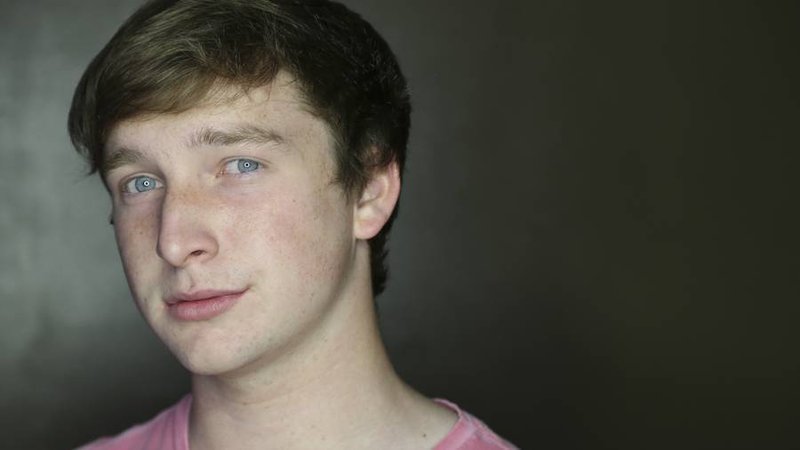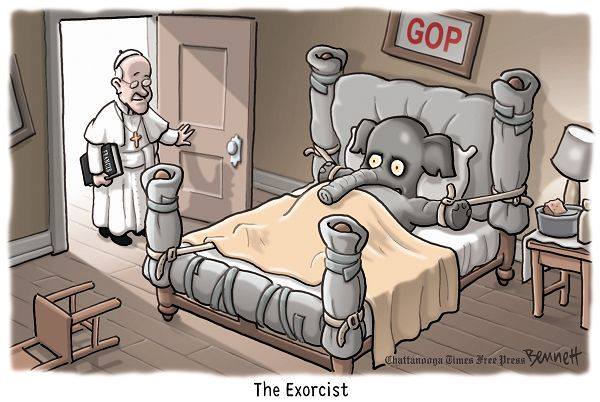Pope Francis made the comments on Wednesday in the context of marriage, family, and religious liberty. LGBT Catholics said they believe the term “unjust discrimination” channels a specific history of antipathy toward gays and lesbians in the church.

In his first visit to the United States, Pope Francis condemned “unjust discrimination” while speaking about religious liberty, family, and marriage. The pope’s overture was couched as a nod to inclusivity, but the remarks nonetheless riled LGBT Catholic leaders who said the unexpected comments echoed talking points from the hierarchy of U.S. bishops who oppose LGBT rights.
The pope’s comments were not entirely specific, however. Delivered at the White House on Wednesday, the remarks were broad enough to possibly address a number of social and political issues facing U.S. Catholics, including health care, contraception, and LGBT rights.
But the pope’s use of “unjust discrimination” — a term that appears in a key Catholic teaching on homosexuality — seemed particularly pointed in that context to LGBT Catholics. They say church officials have used the term to argue that there are, in contrast, just and fair forms of discrimination against LGBT people.
“It is a term that has dangerous ramifications for LGBT people,” said Marianne Duddy-Burke, executive director of the LGBT Catholic organization DignityUSA, who sat in the VIP section at the White House during the pope’s remarks. “To any well tuned LGBT ear, or anyone listening, it is support for a position many U.S. Catholic bishops have taken — which is against same-sex marriage, the right to fire married gay employees or transgender employees, the right to exclude LGBT people from adoption, and to deny LGBT people foster-care services.”
“It set off warning bells,” she told BuzzFeed News.
The term itself — “unjust discrimination” — appears in a key, conflicting paragraph in the Catholic catechism about homosexuality. “This inclination, which is objectively disordered, constitutes for most of them a trial,” it says. “They must be accepted with respect, compassion, and sensitivity. Every sign of unjust discrimination in their regard should be avoided.”
Pope Francis on Wednesday also visited Little Sisters of the Poor, who in 2013 filed a lawsuit to challenge provisions of the Affordable Care Act that require employers to provide contraception coverage. The nuns cite religious objections. While the pope was supporting the nuns’ legal challenge by making an appearance, it is unclear that the pope’s comments earlier in the day were confined to that issue.
Contacted by BuzzFeed News in a phone call, Father Federico Lombardi, a spokesman for the pope, did not clarify which subjects the pope was addressing — same-sex marriage, the Affordable Care Act, homosexuals in the church, or something else — when discussing discrimination and religious freedom.
Since taking leadership of the Catholic Church, Pope Francis has made gestures of tolerance toward LGBT people, such as famously asking, “Who am I to judge?” However, Francis has not pushed for changes to church doctrine, and he has supported a ban on same-sex couples marrying.
Francis DeBernardo, executive director of New Way Ministries, another prominent LGBT Catholic group, told BuzzFeed News, “We haven’t heard that term in a long time — in the three years since Francis has been in — and it is disturbing to hear him resurrect it. I think the record shows that sometimes he speaks out of both sides of his mouth.”
Unjust discrimination has been a talking point for the U.S. Conference of Catholic Bishops, which leads of the country’s roughly 70 million Catholics. In 2013, for example, the bishops told the U.S. Senate to reject a bill that would protect LGBT workers from discrimination while, in the same statement, also saying the bishops oppose unjust discrimination.
While Duddy-Burke was enthusiast about the pope’s visit, she said, “If he winds up enforcing the U.S. bishop’s agenda, that means a continuation of the war on LGBT people from the catholic hierarchy.”
At the White House, the pope said he would “celebrate and support the institutions of marriage and the family at this critical moment in the history of our civilization.”
“American Catholics are committed to building a society which is truly tolerant and inclusive, to safeguarding the rights of individuals and communities, and to rejecting every form of unjust discrimination,” he continued. “With countless other people of good will, they are likewise concerned that efforts to build a just and wisely ordered society respect their deepest concerns and the right to religious liberty. That freedom reminds one of America’s most precious possessions. And, as my brothers, the United States Bishops, have reminded us, all are called to be vigilant, precisely as good citizens, to preserve and defend that freedom from everything that would threaten or compromise it.”
DeBernardo reflected, “I would be fearful that right now the U.S. bishops think that just discrimination would be being able to discriminate against gay and lesbian people who choose to marry.”
He noted that Pope Francis’s comments could be interpreted two ways: that the pope rejects unjustifiable discrimination against LGBT people, or he rejects unjustifiable discrimination against religious people who oppose LGBT rights.
The latter issue has inflamed numerous denominations that support the right to refuse services to same-sex couples on religious grounds.
DeBernardo said he believed the pope was progressive at heart and acknowledged a challenge for the pope’s trip abroad. “I think Francis is really trying to hold the church together, he said. “The Catholic Church around the world and in U.S. is extremely divided over many serious issues.”
Complete Article HERE!




